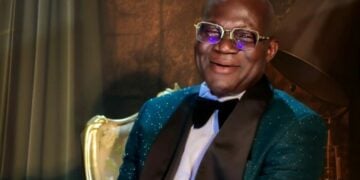My father in journalism. That is what I called him.
The late veteran journalist, George Okoro taught me at the International Institute of Journalism IIJ, Abuja.
Things were tough; and to survive, I used to produce handmade designer greetings cards.
Oga Shabbaz, as we used to call him was a life-loving teacher. He didn’t drink alcohol or smoke cigarettes. He simply loved to look good; and often revealed a chest-full of hair. At some point he carried around a small comb with which he ‘touched up’ his hair every hour or so. He also had a beautiful smile.
He lived in the quarters shared by staff and students of the institute and was everyone’s friend. He abhorred bad grammar.
He was spartan, ready to move at the touch of a button.
Shabbaz taught us Sub-Editing and Design I and II; News Writing And Editing and Features And Editorial Writing. My lowest score in his courses was a B in Features And Editorial Writing. I enjoyed every one of his courses and loved his narrations of the professional challenges he faced in the course of his career.
Shabbaz was a consummate two dimension surface artist.
His lessons in Layout and Design – which I naturally enjoyed because they fused well with the principles involved in producing beautiful hand made greetings cards, are still with me today.
Typography; alignment; choice of colours; varying of sentence length and varying of spaces for stories in order to create a chewable and aesthetically balanced newspaper are lessons he taught which are still fresh in my memory, twenty four years down the line.
But my fondest memories of Shabbaz are not limited to his classroom teachings. He dramatically got me my first newspaper job, which privileged me to work under him.
I had told a friend who worked in Abuja Mirror newspaper that I needed a job, and decided to pay this friend, Timi Beketiri James, a visit in his office to know if anything had happened, positively. Before taking that decision I had trekked all round Abuja looking for work. I had visited the offices of The Guardian; Punch; Vanguard and other newspapers. At one newspaper house the man who received me asked me two questions: Where are you from? Who told you we have jobs for Yoruba people?
Of course I was shocked at the questions and very unhappy.
In school Shabbaz had taught us that a true journalist pushed away his biases. Though I am not Yoruba, I found the ethnic issue raised by the journalist out of place.
A much older journalist at Federal Radio Corporation Of Nigeria FRCN where I later also visited for a job, however cancelled the negative effect I felt by telling me nicely, not to give up in my job search. He prayed for me.
Back to Shabbaz.
As I got into the offices of Abuja Mirror newspaper to locate my friend Timi, I saw Shabbaz seating on the executive consultant’s desk. He asked what brought me and I told him my mission. He introduced me to those around him as his best student, and told me to see him at home in the evening. My friend was not in the office, so I left.
In the evening I trekked to meet Shabbaz. He told me he wanted to let me in on a secret, that was why he requested that I should see him at home.
He said he had written his resignation letter and was waiting for Alhaji Abidina Coomasie – the publisher, tobhand it in, when I popped up. And because he wants me to get a job with the newspaper he took a quick decision to hold on with his resignation until he got me the job. There was however a caveat. He told me that as a rookie there was a need for me to be willing to offer my services for free as a freelancer until I was found to be useful enough to be employed. I agreed with his position.
And so, George Okoro – Shabbaz, true to his words stayed with me for three months, giving me several assignments – from rewriting, headlines casting, to sub-editing and design assignments. He pushed me into reviewing media content, error-freeing of copies from syntax , spelling and ethnic-structure flavored writing. He taught me the nitty gritty of newspaper production. He even made me available for assignments I was not thrilled to attend to.
After three months I was invited for a dinner with the publisher, Alhaji Coomasie, who himself was a veteran journalist and war correspondent during the Nigeria civil war. During the dinner I overheard the publisher ask the editor whether I was useful to Abuja Mirror newspaper. The editor affirmed that I was making his job easier; especially in the areas of production and rewriting. Alhaji Coomasie told me he had read some of my ‘promising’ articles and warned me not to cause trouble for myself. He was obviously referring to my articles on Russia and Chechnya. Surprisingly, he gave an instruction there and then, that I should be given an employment letter. That was how I became a newspaper journalist.
About a week after I got my letter of employment Shabbaz submitted his letter of resignation and stopped coming to work totally. He never waited for an acceptance of his resignation. He also did not stay on for a week or two to clear his table and guide the team to cope without him. He left like a man who had been itching to go.
Senior staffers of the newspaper were not happy that he left abruptly but I knew that but for his determination to help me get a job, he had been eager to leave.
During my thank-you visit to him he warned me not to let him down and that since I was good at production I would climb to the top easily.
Several years later, in 2005, after I had moved from Everyday Newspaper to The LEADERSHIP stable, there was a gap created by the departure of late Chief Uche Ezechukwu, which had to be replaced. It was an opportunity for me to invite Shabbaz to come and join us. I told my publisher about it and was given the go-ahead to approach Shabbaz for a job.
After interacting with Shabbaz, our chairman, the late Mr Sam Nda-Isaiah told us Shabbaz was clearly way above the person he was being interviewed to replace, as such would be given a higher job title.
Shabbaz was my mentor and he made sure he lit the way for me to follow. Unfortunately he suddenly went off the radar after leaving The LEADERSHIP. In my search for him I reached out to journalism colleagues on Facebook and made some calls. But nobody could trace him.
Shabbaz, who was one hundred percent Igbo, stuck out his neck for me, a young Ebira man, got me the job that started me off in my career, and showed me tough love while I was working under him.
He taught me to read and re-read my writings for faults. He taught me to not judge others through an ethnic or race prism. He told me stories of the Zikist movement, the civil war, journalism before the coming of computers and taught me to be a smiler.
Adieu George Okoro (Shabaaz). Sooner or later, like all mortals, we will join you.
May your soul Rest In Peace.
– Balogun, is an Abuja based Media Consultant





